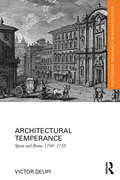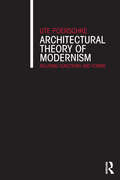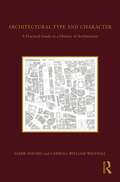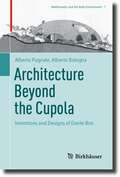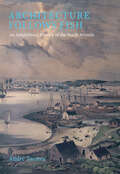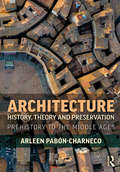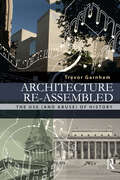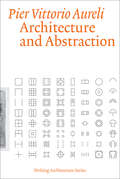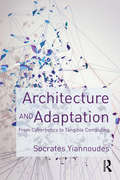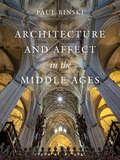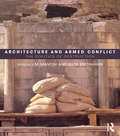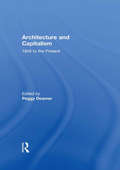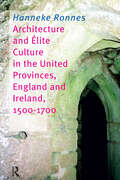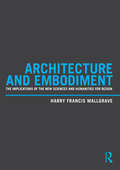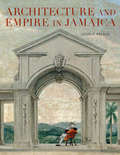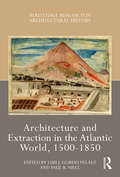- Table View
- List View
Architectural Styles: A Visual Guide
by Margaret Fletcher Robbie PolleyA hand-drawn guide to architectural styles throughout historyArchitectural Styles is an incomparable guide to architectural styles across the centuries and around the world. Modeled after an architect's plein air sketchbook, the volume features hundreds of detailed drawings by esteemed architectural illustrator Robbie Polley alongside incisive and informative descriptions. This unique guidebook takes readers from Europe and the Americas to Egypt, China, and India. It covers a host of historical and contemporary architectural styles, from ancient and classical to Pre-Columbian, Romanesque, Renaissance, Palladian, art nouveau, Brutalist, and biomorphic. It describes the histories and characteristics of the building traditions of each era and region of the world, and looks at key architectural elements such as buttresses, spandrels, curtain walls, and oculi. The book also includes a section on building parts—from domes and columns to towers, arches, roofs, and vaulting—along with a detailed glossary and bibliography.Comprehensive and authoritative, Architectural Styles is an essential resource for architects and designers and a must-have illustrated guide for anyone interested in architecture or drawing.
Architectural Temperance: Spain and Rome, 1700-1759 (Routledge Research in Architecture)
by Victor DeupiArchitectural Temperance examines relations between Bourbon Spain and papal Rome (1700-1759) through the lens of cultural politics. With a focus on key Spanish architects sent to study in Rome by the Bourbon Kings, the book also discusses the establishment of a program of architectural education at the newly founded Real Academia de Bellas Artes de San Fernando in Madrid. Victor Deupi explores why a powerful nation like Spain would temper its own building traditions with the more cosmopolitan trends associated with Rome; often at the expense of its own national and regional traditions. Through the inclusion of previously unpublished documents and images that shed light on the theoretical debates which shaped eighteenth-century architecture in Rome and Madrid, Architectural Temperance provides readers with new insights into the cultural history of early modern Spain.
Architectural Terra Cotta: Design Concepts, Techniques and Applications
by John Rowell Donald B. CornerArchitectural Terra Cotta examines the evolution of terra cotta and prepares architects and builders to make new, creative uses of the timeless material. Terra cotta is among the oldest of manufactured building products, yet it has once again become a material of choice in contemporary façade design. From the walls of Babylon to high performance rainscreens, terra cotta claddings have repeatedly proven to be technically superior and aesthetically triumphant. Understanding the evolution of terra cotta prepares architects to add new, creative chapters to a rich history. This book describes the key attributes that recommend the use of terra cotta and explain its continuing success. The core of the book traces the many ways that terra cotta can be formed, finished and applied to buildings. These techniques demonstrate the full potential of the material, showing how its unique capabilities have been developed over time. A comprehensive inventory of recent examples, project case studies and architectural details, this book provide a basis for understanding the nature of the material and the opportunities it offers in new work. With over 150 color images, this volume provides a concise resource for all those considering terra cotta as a façade system: architects, façade engineers, cladding subcontractors, materials suppliers, developers and prospective clients. With inspiring examples of expressive possibility, this invaluable book will find a home with students and professionals alike interested in making rich, colorful and durable buildings.
Architectural Theory of Modernism: Relating Functions and Forms
by Ute PoerschkeArchitectural Theory of Modernism presents an overview of the discourse on function-form concepts from the beginnings, in the eighteenth century, to its peak in High Modernism. Functionalist thinking and its postmodern criticism during the second half of the twentieth century is explored, as well as today's functionalism in the context of systems theory, sustainability, digital design, and the information society. The book covers, among others, the theories of Carlo Lodoli, Gottfried Semper, Eugène-Emmanuel Viollet-le-Duc, Louis Sullivan, Frank Lloyd Wright, Hannes Meyer, Adolf Behne, CIAM, Jane Jacobs, Robert Venturi and Denise Scott Brown, Charles Jencks, William Mitchell, and Manuel Castells.
Architectural Thinking in a Climate Emergency
by Sofie Pelsmakers James Benedict BrownWhat is the role of architecture – and the architect – in the Anthropocene?It’s an immutable fact: human activity is driving the climate and biodiversity crises that now threaten all life. The damage we inflict on the planet undermines basic human rights, displaces millions, and intensifies structural racism, sexism and segregation, with the greatest burden falling on the most vulnerable people and ecosystems.Architects must act.The design and construction of most buildings and urban environments today are rooted in an economic model that pursues infinite growth. Our profession is embedded in a paradigm that favours individual gain over collective benefit. We are rewarded for overlooking the interdependence between people and the natural world. Architecture contributes directly to environmental degradation and social injustice.Architects agree that the profession must change. But we lack the tools and knowledge to undertake the transformations that are urgently needed. This book aims to address that need through 15 chapters illustrating how we can act collectively to make a difference.Architectural Thinking in a Climate Emergencybrings together writers, researchers, educators, students and practitioners working at the forefront of this transformation. Contributors come from fourteen countries across Africa, Asia, Europe, North and South America and Oceania. Many are leading voices in their fields; others are emerging thinkers introducing fresh perspectives from both academia and practice.Above all, they each affirm the architect’s responsibility to help transition toward carbon-neutral, sustainable practices that advance social and environmental justice.The Open Access version of this book, available at http://www.taylorfrancis.com, has been made available under a Creative Commons Attribution-Non Commercial-No Derivatives (CC BY-NC-ND) 4.0 license.
Architectural Type and Character: A Practical Guide to a History of Architecture
by Carroll William Westfall Samir YounésArchitectural Type and Character provides an alternative perspective to the current role given to history in architecture, reunifying architectural history and architectural design to reform architectural discourse and practice. Historians provide important material for appreciating buildings and guiding those who produce them. In current histories, a building is the product of a time, its form follows its function, irresistible influences produce it, and style, preferably novel, is its most important attribute. This book argues for an alternative. Through a two-part structure, the book first develops the theoretical foundations for this alternative history of architecture. The second part then provides drawings and interpretations of over one hundred sites from different times and places. Architectural Type and Character: A Practical Guide to a History of Architecture is an excellent desk reference and studio guide for students and architectures alike to understand, analyze, and create buildings.
Architectural Type and Character: A Practical Guide to a History of Architecture
by Carroll William Westfall Samir YounésArchitectural Type and Character provides an alternative perspective to the current role given to history in architecture, reunifying architectural history and architectural design to reform architectural discourse and practice. Historians provide important material for appreciating buildings and guiding those who produce them. In current histories, a building is the product of a time, its form follows its function, irresistible influences produce it, and style, preferably novel, is its most important attribute. This book argues for an alternative. Through a two-part structure, the book first develops the theoretical foundations for this alternative history of architecture. The second part then provides drawings and interpretations of over one hundred sites from different times and places.Architectural Type and Character: A Practical Guide to a History of Architecture is an excellent desk reference and studio guide for students and architectures alike to understand, analyze, and create buildings.
Architecture Beyond the Cupola: Inventions and Designs of Dante Bini (Mathematics and the Built Environment #7)
by Alberto Pugnale Alberto BolognaThis book reviews Dante Bini’s inventions and designs, focusing on his form-resistant Binishell and other pneumatic construction systems. Dante Bini’s double profile of architect and builder underpins the narrative of the entire book. It is used to analyse the evolution of the early reinforced-concrete Binishell patent into a variety of automated construction systems based on the use of air. Dante Bini has always been quite proactive in promoting his work and disseminating the results of his experimentations and achievements via journal articles, conference presentations and public talks; promotional brochures in multiple languages were also prepared to export and license his patents in various countries, from Italy to the Americas and Australia. Despite this, a rigorous study of Dante Bini’s work is still unavailable, and the relevance of this figure to contemporary architecture has yet to be discussed comprehensively. This book fills in this gap and arrives at the right time: during the last two decades, there has been an exponential interest in shell and spatial structures, particularly concerning the use of complex geometries and innovative construction techniques. This book will be of interest to academics in architectural design, theory and construction history, and practitioners and students interested in expanding their knowledge in the design and construction of shell and spatial structures.
Architecture Follows Fish: An Amphibious History of the North Atlantic
by Andre TavaresA highly original exploration of the history of architecture in relation to fish, shedding light on the connection between marine environments and terrestrial landscapes.Architecture Follows Fish is set in the North Atlantic, and its protagonist is fish. In this book author and architect André Tavares explores the notion of fishing architecture, a concept coined to describe architectural practices that are spawned by fisheries. To encompass the scope of fishing architecture, and to establish the connections between marine ecology and architectural practice, the book oscillates between different continents, centuries, and species. Fisheries are unique, and this book sheds light on that uniqueness through an articulated narrative and a wealth of iconography.Up until now there has been no history of architecture from the perspective of fish, although there are counterparts for meat, timber, oil, and many other industries. Tavares provides a counternarrative to the traditional history of marine environments, which tends to focus on water ecosystems, and instead forms a bridge between what happens at sea and what happens on land. The hope is that, after reading this book, readers will better understand life in the sea in relation to urban growth and terrestrial landscapes.
Architecture History, Theory and Preservation: Prehistory to the Middle Ages
by Arleen Pabón-CharnecoArchitecture History, Theory and Preservation critically explores the historic development, theoretical underpinnings and conservation practices of architecture. Complete with 170 full color images, this volume presents architectural and urban examples, from Prehistory to the Middle Ages, chronologically and thematically examining contextual issues that provide each period with distinctive expressions. The special features, structural systems, materials and construction technologies are analyzed, as well as how the international community deals with the task of interpreting and preserving certain historic properties. This publication provides professors and students of architecture, art history, historic preservation and related fields with an integrated view of architecture using historical, theoretical and conservation perspectives. As an architect, architectural historian and preservationist herself, Dr Pabón-Charneco weaves a field of relationships regarding each building, creating a silent yet empowering bridge between past and present.
Architecture Matters
by Aaron BetskyAn illuminating introduction to the influence of architecture on the world, the environment, and human lives Architecture matters. It matters to cities, the planet, and human lives. How architects design and what they build has an impact that usually lasts for generations. The more we understand architecture—the deeper we probe the decisions and designs that go into making a building—the better our world becomes. Aaron Betsky, architect, author, curator, former museum director, and currently the dean of the Frank Lloyd Wright School of Architecture, guides readers into the rich and complex world of contemporary architecture. Combining his early experiences as an architect with his extensive experience as a jury member selecting the world’s most prominent and cutting-edge architects to build icons for cities, Betsky possesses rare insight into the mechanisms, politics, and personalities that play a role in how buildings in our societies and urban centers come to be. In approximately fifty themes, drawing on his inside knowledge of the architectural world, he explores a broad spectrum of topics, from the meaning of domestic space to the spectacle of the urban realm. Accessible, instructive, and hugely enjoyable, Why Architecture Matters will open the eyes of anyone dreaming of becoming an architect, and will bring a wry smile to anyone who already is.
Architecture Re-assembled: The Use (and Abuse) of History
by Trevor GarnhamBeginning from the rise of modern history in the eighteenth century, this book examines how changing ideas in the discipline of history itself has affected architecture from the beginning of modernity up to the present day. It reflects upon history in order to encourage and assist the reader in finding well-founded principles for architectural design. This is not simply another history of architecture, nor a ‘history of histories’. Setting buildings in their contemporaneous ideas about history, it spans from Fischer von Erlach to Venturi and Rossi, and beyond to architects working in the fallout from both the Modern Movement – Aalto, Louis Kahn, Aldo van Eyck – and Post-modernism – such as Rafael Moneo and Peter Zumthor. It shows how Soane, Schinkel and Stirling, amongst others, made a meaningful use of history and contrasts this with how a misreading of Hegel has led to an abuse of history and an uncritical flight to the future. This is not an armchair history but a lively discussion of our place between past and future that promotes thinking for making.
Architecture against Democracy: Histories of the Nationalist International
by Claire Zimmerman Reinhold MartinExamining architecture&’s foundational role in the repression of democracy Reinhold Martin and Claire Zimmerman bring together essays from an array of scholars exploring the troubled relationship between architecture and antidemocratic politics. Comprising detailed case studies throughout the world spanning from the early nineteenth century to the present, Architecture against Democracy analyzes crucial occasions when the built environment has been harnessed as an instrument of authoritarian power. Alongside chapters focusing on paradigmatic episodes from twentieth-century German and Italian fascism, the contributors examine historic and contemporary events and subjects that are organized thematically, including the founding of the Smithsonian Institution, Ellis Island infrastructure, the aftermath of the Paris Commune, Cold War West Germany and Iraq, Frank Lloyd Wright&’s domestic architecture, and Istanbul&’s Taksim Square. Through the range and depth of these accounts, Architecture against Democracy presents a selective overview of antidemocratic processes as they unfold in the built environment throughout Western modernity, offering an architectural history of the recent &“nationalist international.&” As new forms of nationalism and authoritarian rule proliferate across the globe, this timely collection offers fresh understandings of the role of architecture in the opposition to democracy. Contributors: Esra Akcan, Cornell U; Can Bilsel, U of San Diego; José H. Bortoluci, Getulio Vargas Foundation; Charles L. Davis II, U of Texas at Austin; Laura diZerega; Eve Duffy, Duke U; María González Pendás, Cornell U; Paul B. Jaskot, Duke U; Ana María León, Harvard U; Ruth W. Lo, Hamilton College; Peter Minosh, Northeastern U; Itohan Osayimwese, Brown U; Kishwar Rizvi, Yale U; Naomi Vaughan; Nader Vossoughian, New York Institute of Technology and Columbia U; Mabel O. Wilson, Columbia U.
Architecture and Abstraction (Writing Architecture)
by Pier Vittorio AureliA landmark study of abstraction in architectural history, theory, and practice that challenges our assumptions about the meaning of abstract forms.In this theoretical study of abstraction in architecture—the first of its kind—Pier Vittorio Aureli argues for a reconsideration of abstraction, its meanings, and its sources. Although architects have typically interpreted abstraction in formal terms—the purposeful reduction of the complexities of design to its essentials—Aureli shows that abstraction instead arises from the material conditions of building production. In a lively study informed by Walter Benjamin, Karl Marx, Alfred Sohn-Rethel, and other social theorists, this book presents abstraction in architecture not as an aesthetic tendency but as a movement that arises from modern divisions of labor and consequent social asymmetries. These divisions were anticipated by the architecture of antiquity, which established a distinction between manual and intellectual labor, and placed the former in service to the latter. Further abstractions arose as geometry, used for measuring territories, became the intermediary between land and money and eventually produced the logic of the grid. In our own time, architectural abstraction serves the logic of capitalism and embraces the premise that all things can be exchanged—even experience itself is a commodity. To resist this turn, Aureli seeks a critique of architecture that begins not by scaling philosophical heights, but by standing at the ground level of material practice.
Architecture and Adaptation: From Cybernetics to Tangible Computing
by Socrates YiannoudesArchitecture and Adaptation discusses architectural projects that use computational technology to adapt to changing conditions and human needs. Topics include kinetic and transformable structures, digitally driven building parts, interactive installations, intelligent environments, early precedents and their historical context, socio-cultural aspects of adaptive architecture, the history and theory of artificial life, the theory of human-computer interaction, tangible computing, and the social studies of technology. Author Socrates Yiannoudes proposes tools and frameworks for researchers to evaluate examples and tendencies in adaptive architecture. Illustrated with more than 50 black and white images.
Architecture and Affect in the Middle Ages (Franklin D. Murphy Lectures)
by Paul BinskiHow did people living in the Middle Ages respond to spectacular buildings, such as the Gothic cathedrals? While contemporary scholarship places a large emphasis on the emotional content of Western medieval figurative art, the emotion of architecture has largely gone undiscussed. In a radical new approach, Architecture and Affect in the Middle Ages explores the relationship between medieval buildings and the complexity of experience they engendered. Paul Binski examines long-standing misconceptions about the way viewers responded to medieval architecture across Western Europe and in Byzantine and Arabic culture between late antiquity and the end of the medieval period. He emphasizes the importance of the experience itself within these built environments, essentially places of action, space, and structure but also, crucially, of sound and emotion.
Architecture and Architects in Socialist Poland: Between Stalin and Le Corbusier (Routledge Research in Architecture)
by Błażej CiarkowskiThe book presents the history of Polish architecture and architects in the years 1944-1989, focusing on selected issues, including both the development of architecture itself and the conditions of practicing architecture in the socialist country.The history of architecture and architects in socialist Poland is described not only from the perspective of an architectural historian and researcher but also from the perspective of active participants in the events described. The text is based on historical sources and literature, as well as on numerous interviews with architects and urban planners who played an important role in post-war reconstruction, implementation of the socialist-realist doctrine, creation of the most significant buildings and monuments, and development of the local version of socialist modernism or post-modernism. It gives the floor back to those whose voice was hardly heard after the collapse of the socialist system in 1989.The book should become an interesting source of information for those interested in the material culture of former socialist countries. Although it focuses on socialist Poland, it can be used as material for comparative studies of mutual relations between East and West in post-war Europe, as well as for analysis of the situation of architecture and architects in socialist countries.
Architecture and Armed Conflict: The Politics of Destruction
by Keith Bresnahan J. M. ManciniArchitecture and Armed Conflict is the first multi-authored scholarly book to address this theme from a comparative, interdisciplinary perspective. By bringing together specialists from a range of relevant fields, and with knowledge of case studies across time and space, it provides the first synthetic body of research on the complex, multifaceted subject of architectural destruction in the context of conflict. The book addresses several specific research questions: How has the destruction of buildings and landscapes figured in recent historical conflicts, and how have people and states responded to it? How has the destruction of architecture been represented in different historical periods, and to what ends? What are the relationships between the destruction of architecture and the destruction of art, particularly iconoclasm? If architectural destruction is a salient feature of many armed conflicts, how does it feature in post-conflict environments? What are the relationships between architectural destruction and processes of restoration, recreation or replacement? Considering multiple conflicts, multiple time periods, and multiple locations allows this international cohort of authors to provide an essential primer for this crucial topic.
Architecture and Capitalism: 1845 to the Present
by Peggy DeamerArchitecture and Capitalism tells a story of the relationship between the economy and architectural design. Eleven historians each discuss in brand new essays the time period they know best, looking at cultural and economic issues, which in light of current economic crises you will find have dealt with diverse but surprisingly familiar economic issues. Told through case studies, the narrative begins in the mid-nineteenth century and ends with 2011, with introductions by Editor Peggy Deamer to pull the main themes together so that you can see how other architects in different times and in different countries have dealt with similar economic conditions. By focussing on what previous architects experienced, you have the opportunity to avoid repeating the past. With new essays by Pier Vittorio Aureli, Ellen Dunham-Jones, Keller Easterling, Lauren Kogod, Robert Hewison, Joanna Merwood-Salisbury, Robin Schuldenfrei, Deborah Gans, Simon Sadler, Nathan Rich, and Micahel Sorkin.
Architecture and Collective Life
by Penny LewisThis book addresses the complex relationship between architecture and public life. It’s a study of architecture and urbanism as cultural activity that both reflects and gives shape to our social relations, public institutions and political processes. Written by an international range of contributors, the chapters address the intersection of public life and the built environment around the themes of authority and planning, the welfare state, place and identity and autonomy. The book covers a diverse range of material from Foucault’s evolving thoughts on space to land-scraping leisure centres in inter-war Belgium. It unpacks concepts such as ‘community’ and ‘collectivity’ alongside themes of self-organisation and authorship. Architecture and Collective Life reflects on urban and architectural practice and historical, political and social change. As such this book will be of great interest to students and academics in architecture and urbanism as well as practicing architects.
Architecture and Elite Culture in the United Provinces, England and Ireland, 1500-1700
by Hanneke RonnesThis study aims to elucidate concepts of castle in the Netherlands, England and Ireland in both past en present times. The first part of the book examines current, respectively, academic, national and personal appropriations of 'castle' the second part moves into the past, juxtaposing elite culture and the spatial organisation of 16th and 17th century domestic architecture.
Architecture and Embodiment: The Implications of the New Sciences and Humanities for Design
by Harry Francis MallgraveIn recent years we have seen a number of dramatic discoveries within the biological and related sciences. Traditional arguments such as "nature versus nurture" are rapidly disappearing because of the realization that just as we are affecting our environments, so too do these altered environments restructure our cognitive abilities and outlooks. If the biological and technological breakthroughs are promising benefits such as extended life expectancies, these same discoveries also have the potential to improve in significant ways the quality of our built environments. This poses a compelling challenge to conventional architectural theory... This is the first book to consider these new scientific and humanistic models in architectural terms. Constructed as a series of five essays around the themes of beauty, culture, emotion, the experience of architecture, and artistic play, this book draws upon a broad range of discussions taking place in philosophy, psychology, biology, neuroscience, and anthropology, and in doing so questions what implications these discussions hold for architectural design. Drawing upon a wealth of research, Mallgrave argues that we should turn our focus away from the objectification of architecture (treating design as the creation of objects) and redirect it back to those for whom we design: the people inhabiting our built environments.
Architecture and Empire in Jamaica
by Louis NelsonThrough Creole houses and merchant stores to sugar fields and boiling houses, Jamaica played a leading role in the formation of both the early modern Atlantic world and the British Empire. Architecture and Empire in Jamaica offers the first scholarly analysis of Jamaican architecture in the long 18th century, spanning roughly from the Port Royal earthquake of 1692 to Emancipation in 1838. In this richly illustrated study, which includes hundreds of the author's own photographs and drawings, Louis P. Nelson examines surviving buildings and archival records to write a social history of architecture.  Nelson begins with an overview of the architecture of the West African slave trade then moves to chapters framed around types of buildings and landscapes, including the Jamaican plantation landscape and fortified houses to the architecture of free blacks. He concludes with a consideration of Jamaican architecture in Britain. By connecting the architecture of the Caribbean first to West Africa and then to Britain, Nelson traces the flow of capital and makes explicit the material, economic, and political networks around the Atlantic. Â
Architecture and Extraction in the Atlantic World, 1500-1850 (Routledge Research in Architectural History)
by Luis Gordo Peláez Paul NiellThis edited collection examines the development of Atlantic World architecture after 1492. In particular, the chapters explore the landscapes of extraction as material networks that brought people, space, and labor together in harvesting raw materials, cultivating agriculture for export-level profits, and circulating raw materials and commodities in Europe, Africa, and the Americas from 1500 to 1850. This book argues that histories of extraction remain incomplete without careful attention to the social, physical, and mental nexus that is architecture, just as architecture’s development in the last 500 years cannot be adequately comprehended without attention to empire, extraction, colonialism, and the rise of what Immanuel Wallerstein has called the world system. This world system was possible because of built environments that enabled resource extraction, transport of raw materials, circulation of commodities, and enactment of power relations in the struggle between capital and labor. Separated into three sections: Harvesting the Environment, Cultivating Profit, and Circulating Commodities: Networks and Infrastructures, this volume covers a wide range of geographies, from England to South America, from Africa to South Carolina. The book aims to decenter Eurocentric approaches to architectural history to expose the global circulation of ideas, things, commodities, and people that constituted the architecture of extraction in the Atlantic World. In focusing on extraction, we aim to recover histories of labor exploitation and racialized oppression of interest to the global community. The book will be of interest to researchers and students of architectural history, geography, urban and labor history, literary studies, historic preservation, and colonial studies.
Architecture and Film
by Mark LamsterArchitecture and Film looks at the ways architecture and architects are treated on screen and, conversely, how these depictions filter and shape the ways we understand the built environment. It also examines the significant effect that the film industry has had on the American public's perception of urban, suburban, and rural spaces. Contributors to this collection of essays come from a wide range of disciplines. Nancy Levinson from Harvard Design Magazine writes on how films from The Fountainhead to Jungle Fever have depicted architects. Eric Rosenberg from Tufts University looks at how architecture and spatial relations shape the Beatles films A Hard Day's Night, Help!, and Let It Be. Joseph Rosa, curator at the National Building Museum, discusses why modern domestic architecture in recent Hollywood films such as The Ice Storm, L. A. Confidential, and The Big Lebowski has become synonymous with unstable inhabitants. I.D. Magazine writer Peter Hall discusses the history of film titling, focusing on the groundbreaking work of Saul Bass and Maurice Binder. Edited by Mark Lamster examines the anti-urbanism of the Star Wars trilogy. The collection also includes the voices of those from within the film industry, who are uniquely able to provide a "behind the scenes" perspective: film Edited by Bob Eisenhardt comments on the making of Concert of Wills, a documentary on the construction of the Getty Museum; and Robert Kraft focuses on his work as a location director for Diane Keaton's upcoming film about Los Angeles. Also included are interviews with David Rockwell, architect of numerous Planet Hollywood restaurants worldwide and designer of a new hall to host the Academy Awards ceremony; Kyle Kooper, who created title sequences for Seven and Mission Impossible; and motion picture art director Jan Roelfs, whose credits include Gattaca, Orlando, and Little Women.

